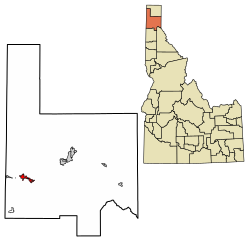2010 census
As of the census [3] of 2010, there were 1,751 people, 713 households, and 474 families living in the city. The population density was 474.5 inhabitants per square mile (183.2/km2). There were 798 housing units at an average density of 216.3 per square mile (83.5/km2). The racial makeup of the city was 93.3% White, 0.1% African American, 1.1% Native American, 0.6% Asian, 0.2% Pacific Islander, 0.8% from other races, and 3.9% from two or more races. Hispanic or Latino of any race were 2.1% of the population.
There were 713 households, of which 34.5% had children under the age of 18 living with them, 44.5% were married couples living together, 12.2% had a female householder with no husband present, 9.8% had a male householder with no wife present, and 33.5% were non-families. 28.1% of all households were made up of individuals, and 12.7% had someone living alone who was 65 years of age or older. The average household size was 2.45 and the average family size was 2.98.
The median age in the city was 38.1 years. 26.7% of residents were under the age of 18; 8.6% were between the ages of 18 and 24; 23.5% were from 25 to 44; 25.5% were from 45 to 64; and 15.8% were 65 years of age or older. The gender makeup of the city was 49.2% male and 50.8% female.
2000 census
As of the census [12] of 2000, there were 1,754 people, 692 households, and 469 families living in the city. The population density was 1,098.8 inhabitants per square mile (424.2/km2). There were 762 housing units at an average density of 477.4 per square mile (184.3/km2). The racial makeup of the city was 94.70% White, 1.43% Native American, 0.46% Asian, 0.51% from other races, and 2.91% from two or more races. Hispanic or Latino of any race were 1.60% of the population.
There were 692 households, out of which 35.1% had children under the age of 18 living with them, 54.9% were married couples living together, 9.1% had a female householder with no husband present, and 32.2% were non-families. 26.6% of all households were made up of individuals, and 12.4% had someone living alone who was 65 years of age or older. The average household size was 2.53 and the average family size was 3.09.
In the city, the population was spread out, with 28.9% under the age of 18, 8.4% from 18 to 24, 26.6% from 25 to 44, 21.9% from 45 to 64, and 14.1% who were 65 years of age or older. The median age was 35 years. For every 100 females, there were 96.0 males. For every 100 females age 18 and over, there were 93.3 males.
The median income for a household in the city was $26,765, and the median income for a family was $32,198. Males had a median income of $30,607 versus $16,034 for females. The per capita income for the city was $14,125. About 14.0% of families and 18.9% of the population were below the poverty line, including 27.7% of those under age 18 and 9.7% of those age 65 or over.


